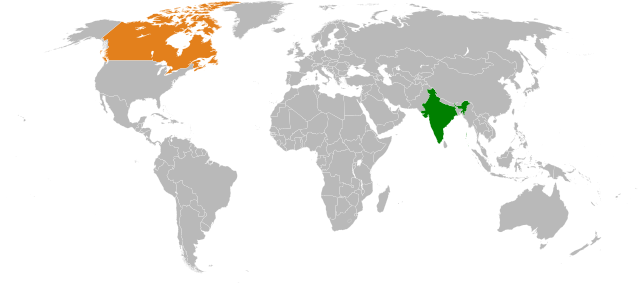In a move that has sent shockwaves through diplomatic circles, India has temporarily suspended the issuance of visas to Canadian citizens. This decision comes amid a rapidly escalating dispute over the assassination of a Sikh separatist leader on Canadian soil.
The Indian government has cited "security threats" that have disrupted the operations of its diplomatic missions in Canada as the primary reason for this drastic measure. The tensions between the two nations reached a boiling point earlier this week when Canadian Prime Minister Justin Trudeau suggested that India might have had a hand in the June 18 assassination. India has vehemently denied these allegations, labeling them as "absurd."
Speaking from the sidelines of the UN General Assembly in New York, Trudeau emphasized the importance of maintaining a working relationship with India. He stated, "There is no question that India is a country of growing importance and a country we need to continue to work with." Trudeau further clarified that Canada wasn't trying to provoke India but remained firm on the importance of upholding the rule of law and ensuring the safety of Canadians.
The diplomatic relations between these two key trade and security partners, both allies of the U.S., have been tense for several months. Current events suggest that they might have reached their lowest point. The Indian government has made it clear that the visa suspension also applies to Canadians residing in third countries. They cited threats made to their embassy and consulates in Canada, which have hampered their regular operations.
In a swift response, Canada announced a reduction in its diplomatic personnel in India, attributing the decision to threats received by some diplomats on social media platforms. However, Canada's visa services in India remain operational.
The ties between India and Canada run deep, with Canada being home to 1.4 million people of Indian origin, a significant portion of whom are Sikhs. India is also the largest source of international students for Canada, with Indian students constituting 40% of the total overseas student population in 2022.
The current dispute was ignited when Canada linked India to the assassination of separatist leader Hardeep Singh Nijjar, a Canadian citizen. Nijjar was gunned down outside a Sikh temple in British Columbia. Trudeau mentioned that Canada's intelligence agencies were probing the possibility of "agents of the government of India" being involved in this killing. India has consistently denied these allegations and has accused Canada of trying to divert attention from Khalistani extremists residing in Canada.
The Khalistan movement, which peaked in the 1980s, aimed at creating a separate Sikh homeland. While its influence has waned in India, it still finds support among some sections of the Sikh diaspora in countries like Canada, Australia, and the UK.
As the situation continues to evolve, the international community watches closely, hoping that the two nations can find common ground and resolve their differences amicably.





